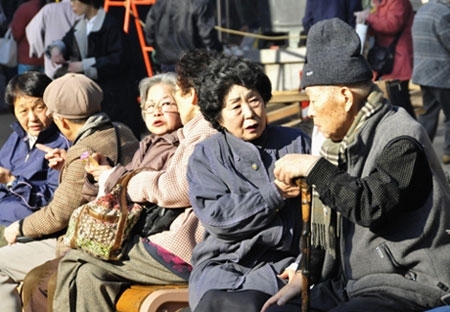More than 100,000 people a year in Japan leave their jobs to care for sick elderly relatives, according to the government, and most of them remain unemployed after their death.
根据日本政府的数据,每年日本有超过10万名工薪族辞掉工作以专心照顾病弱的年老亲人。而当老人故去后,这些人中的绝大部分保持着失业状态。
The tally is set to balloon as the nearly 7 million-strong baby-boomer generation reaches the age of 75 in the coming decade, potentially dragging their children from the workforce in their prime earning years. That's something Japan can ill afford, as the working-age population shrinks due to the low birthrate and the government's rejection of immigration.
鉴于日本婴儿潮时期出生的近700万人将在未来十年内达到75岁,可能会令正处在赚钱黄金时期的子女退出劳动力大军,这个数字预计还将大幅增长。当因为低出生率和政府拒绝开放移民的原因,使得处于工作年龄的人口数量大幅减少时,日本这个国家可能就难以承受了。

Prime Minister Shinzo Abe vowed in September to stem the flow, which he referred to as an "imminent crisis." In a speech, he set out targets for growing the economy to 600 trillion yen from the current 500 trillion yen, preventing the population from falling below 100 million from the current 127 million, and enabling as many people as possible to work, whatever their family responsibilities.
日本首相安倍晋三在今年九月表态,要及时遏止这一被他称为“迫在眉睫的危机”的不利形势。在发言中,他表示要确立目标,要将经济总量从现在的500万亿日元提升到600万亿日元,同时还要防止人口从现在的1亿2700万减少到低于1个亿的这一情况的发生。最后,他还要求无论什么样的家庭原因。都要让尽可能多的人去工作。
As a first step, the government last month announced plans to provide an extra 120,000 people with beds in homes for the elderly or other forms of support by the early 2020s. Regulations will be eased to make it easier to open nursing homes in major cities and entitlements to leave and allowances will be revised
作为第一步,日本政府上个月宣布,计划在2020年之前,向有年老者的居民家中额外提供12万张床。政府还将放宽规定,使在主要城市开设养老院更加容易,并将休假和津贴进行修订。
The measures may boost Japan's workforce by a modest 0.2 per cent a year. Still, some researchers say the government's proposals don't address the complexity of the issue.
这些措施将会以每年百分之零点二的速度提升日本的劳动力。但是,一些专家表示,政府的这些提议并不会解决问题的复杂性。
Japan has 16.4m people who are 75 or older. By 2025, the number is projected to swell to 21.8m.
目前日本有1640万75岁及以上的老年人口,到2025年,这一人口数量预计将增至2180万。













